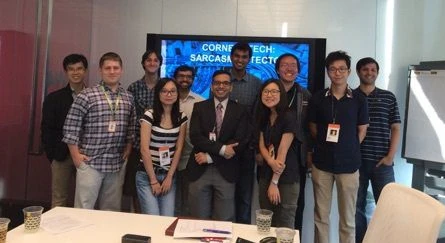Cornell Tech Challenge – Productize Sarcasm Detection (note: this is not sarcasm)
October 12, 2015

From left: Jun-Ping Ng, Bloomberg; Greg Tobkin, Bloomberg; Brendan Ritter, Cornell Tech; Mengjue Wang, Cornell Tech; Karan Bir, Cornell Tech; Sachin Roopani, Bloomberg; Shreyas Kulkarni, Cornell Tech; Hesed Kim, Cornell Tech; Christopher Hong, Bloomberg; Ming Chen, Cornell Tech; Clario Menezes, Bloomberg.
Analyzing the sentiment in communications of all types – from Tweets, to commentary, to news articles – is a difficult task but a valuable commodity to our Bloomberg Terminal customers. With the volume of information increasing exponentially and daily, our ability to provide the most relevant information to our customers becomes more critical.
That is why we are pleased to once again have a project selected by Cornell Tech for their semester long company challenge. This year’s Bloomberg project: “How might we improve and productize sarcasm detection?”
A team of six Computer Science M.Eng., Info Science M.S., and MBA students will be working with Bloomberg R&D and Global Data to design, build, and pitch a product providing automated sarcasm detection.
This challenge was inspired by Christopher Hong – the project mentor – and his 2014 master’s thesis, which investigated sarcasm detection incorporating context and real world knowledge. Sarcasm is generally a bitter remark that is aimed at someone or something where the implied meaning of a statement is the opposite of the literal meaning. Although it is a simple concept, it can be difficult to detect by humans and even more so by computers.
To tackle this challenge, students will practice and apply a wide array of technical and business skills. Both engineering and MBA students will learn more about the meaning and nuances of sarcasm and its direct impact (negative and positive) in communication. Technical students will get hands-on experience with a variety of machine learning and artificial intelligence techniques; business students will practice market research, design a product, prioritize features, and construct a product strategy.
The team has the freedom to select the sarcasm-detection application that strikes them as most promising. The final product could be anything from improving sentiment analysis in online product reviews to refining automated monitoring of social media for national security threats through an understanding of sarcastic false positives.
The sentiment improvement application has the potential to find its way back to Bloomberg specifically for teams working on sentiment analysis challenges. An immediate and practical application could be identifying and weeding out sarcastic April Fools’ Day tweets about financial markets or companies, such as when Tesla’s stock spiked 1.5% after they “announced” the new Model W watch.
This is the third collaboration between Bloomberg and the Cornell Tech program. Last year, we challenged students to improve upon eye gaze tracking technology, and the team responded by building Theia, a mobile app that can save lives on the road by automatically detecting drowsiness in truck drivers.
(Rakhee Kher and Christopher Hong from Bloomberg R&D contributed to this blog.)